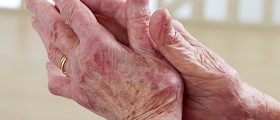
Rheumatoid arthritis is a chronic form of inflammatory arthritis. It affects 1.3 million Americans. The condition affects people of all ages and almost 75% of all cases are women.
Rheumatoid arthritis belongs to a group of autoimmune diseases. It generally occurs in a symmetrical pattern and affects symmetric joints (hands, knees, ankles, feet hips etc.). The symptoms of rheumatoid arthritis include severe joint swelling, pain, joint stiffness and eventual deformities. Patients additionally complain about fatigue, fever, weight loss and they sometimes experience flu-like symptoms. Apart from joints the disease also affects other organs such as the heart, skin and even lungs.
The disease can be rather disabling and in advanced stage patients simply cannot perform certain activities such as tying shoelaces or even walking.
Apart from many joints, knees are frequently affected by rheumatoid arthritis. The inflammation of the joints leads to swelling and the affected joints are warm and tender to touch. There is also a joint stiffness.
Knee Rheumatoid Arthritis: Causes
The actual cause of knee rheumatoid arthritis and rheumatoid arthritis in general has not been identified yet. Still, there is a connection between improper functioning of the immune system and the disease. There may be connection between rheumatoid arthritis and genetics and in some cases the illness may be induced by certain environmental factors.
Knee Rheumatoid Arthritis: Symptoms and Signs
The affected joints are painful, swollen and stiff. Both knees are inflamed and due to inflammation the skin of the particular area is red and warm. Patients may also complain about fever. And finally, there are fatigue and flu-like symptoms.Diagnosing Knee Rheumatoid Arthritis
Patients undergo physical examination and specific blood tests. The doctor takes into consideration the presence of low number of red blood cells, the presence of rheumatoid factor and increased erythrocyte sedimentation rate. Furthermore, it is essential to identify whether there are circulating antibodies to cyclin citrullinated peptides (CCP) and if the level of C-reactive protein is increased. Patients also undergo x-ray of the knees which may point to the damage of the joints. Better insight in structure of the affected joints is achieved by MRI.
Knee Rheumatoid Arthritis: Treatment
The treatment for rheumatoid arthritis is basically medicamentous. Patients may be prescribed one of several groups of medications including disease-modifying anti-rheumatic drugs (DMARDs), non steroidal anti-inflammatory drugs (NSAIDs) and corticosteroids. Which of the previously mentioned medications is going to be prescribed basically depends on the severity of the disease.
Apart from medicamentous treatment patients must engage in physical therapy. Occupational therapy is recommended as well. And finally, at some point when the joints become way too damage total joint replacement is performed.

















Your thoughts on this
Loading...